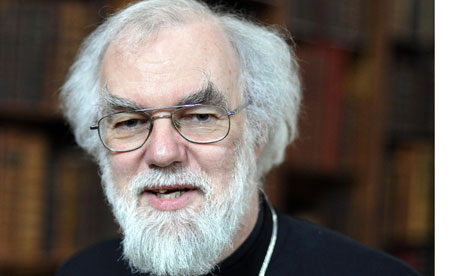 |
| Professor Diarmaid MacCullouch Author of the scholarly work, "Thomas Cranmer" Pro-gay rights spokesperson and, reportedly, a gay himself A scholarly man but with an agenda, a scholar at odds with His Majesty and the 7th commandment, and a scholar who, quite inferably, dislikes the old BCP language about himself as a manifoldly wicked sinner whose sins most justly provoke the indignation and wrath of the Divine Majesty We'll read the textbooks, but chalk his "opinions" up to the predilections of his own sinful nature and choices, a cheeky hubris Judicial hardening, judicial blindness, and the resultant willful obstinacy |

Diocesan synods voted against the covenant, often in the face of great pressure from the vast majority of English bishops, who frequently made sure that the case for the covenant dominated proceedings. The bishops also exerted a certain amount of emotional blackmail, suggesting that if the scheme didn't pass, it would be very upsetting for the archbishop of Canterbury (cue for synod members to watch a podcast from said archbishop, looking sad even while commending the covenant).
Well, it didn't work, and now those particular bishops need to consider their position, as the saying goes. Principally, they need to consider a killer statistic: as the voting has taken place in the dioceses (and there are still a few to go), the pattern has been consistent. Around 80% of the bishops have voted in favour of the covenant, but the clergy and laity votes have split around 50-50 for and against, with votes against nudging ahead among the clergy. That suggests an episcopate that is seriously out of touch, not just with the nation as a whole (we knew that already), but even with faithful Anglican churchgoers and clergy in England.
Why should this be? Probably because bishops mostly spend their time talking to each other, or to very churchy folk whose consuming interest is internal church politics. By contrast, their clergy and laity are out there in the real world, and they know the price of a pint of milk. People in the parishes can also recognise a dodgy argument when they hear it, and the more that the friends of the covenant presented the arguments, the more dodgy they sounded. For example: to pass the covenant is absolutely vital for the Anglican communion worldwide, which will collapse without it; so you have to vote for it to prevent the end of civilisation as we know it. Oh, and actually the covenant won't change anything all that much, so it's perfectly safe to vote for. Which of those is right? Neither, to judge by the reaction of Anglican diocesan synods.
So now Anglicanism needs to move forward and forget this sorry diversion, into which many perfectly well-meaning people poured a huge amount of energy over a decade when they might have been doing something useful. Woe betide any attempt to revive it, though I notice that the secretary general of the Anglican communion (now there's an office that sounds ripe for culling) is clearly determined to keep it alive. To judge by a press statement he issued after the votes, he simply hasn't understood the scale of the catastrophe the covenant has suffered at the hands of ordinary English Anglicans.
Anglicanism has the chance to rediscover painful lessons from its chequered past. After the 16th century Reformation, Scotland, Ireland and England all had churches with bishops. All three churches wanted to monopolise every form of religious expression throughout the realm. All failed.
In the end, episcopal churches were disestablished in Scotland, Ireland and Wales, but even the established Church of England learned that it could not boss around an entire nation, and had to accept that it ministered within a country of many faiths and none. That is a precious lesson to teach its many sister churches worldwide. Try and lay down the law in that delicate, nuanced thing that is religious belief, and you end up damaging or hurting a great many people.
Anglicanism could be seen as a family: in families, you don't expect everyone to think in exactly the same way. You listen, you shout, cry, talk, compromise. You do not show the door to one member of the family, just because you don't agree with them. Now Anglicans can start listening afresh. The present archbishop of Canterbury has their warm good wishes, as he prepares to use his many talents and graces in a different setting. They should ask the next man or woman in the job to reconnect with the church and the nation.
No comments:
Post a Comment